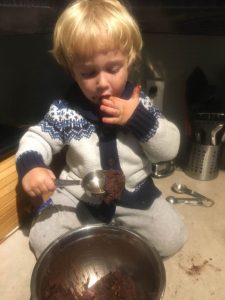Category Archives: Wacky and Weird
The miracle of poop
It’s a question that has perplexed scientists: does diarrhea have a purpose?
That is, is diarrhea is a symptom of disease, or does diarrhea actually help clear the bacteria causing an infection.
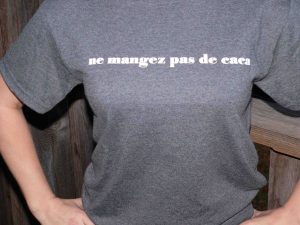 Cecile Borkhataria of the Daily Mail reports that scientists have found in sick mice, proteins caused microscopic leaks in the intestinal wall that let water in, making the mouse poop looser and limiting disease severity.
Cecile Borkhataria of the Daily Mail reports that scientists have found in sick mice, proteins caused microscopic leaks in the intestinal wall that let water in, making the mouse poop looser and limiting disease severity.
The study, conducted by researchers at Brigham and Women’s Hospital (BWH), looked at the immune mechanisms that drive diarrhea.
Diarrhea can have many different causes, including infections, certain types of medications, too much caffeine or alcohol and many more.
It happens when there’s an excess of water in the intestines, which is normally re-absorbed by the body.
The intestinal wall is lined with cells, and some water can pass through the cells, holes in the lining or via junctions between the cells.
‘The hypothesis that diarrhea clears intestinal pathogens has been debated for centuries,’ said corresponding author of the study Dr Jerrold Turner of the BWH Departments of Pathology and Medicine.
‘Its impact on the progression of intestinal infections remains poorly understood.
‘We sought to define the role of diarrhea and to see if preventing it might actually delay pathogen clearance and prolong disease.’
To conduct the study, the researchers used a mouse infected with a bacteria called Citrobacter rodentium – the mouse equivalent of an E. coli infection.
Within two days of the mouse being infected, the researchers saw an increase in the permeability of the mouse’s intestinal barrier – leading to water entering the intestines, causing diarrhea.
This occurred well before inflammation cellular damage of the intestines.
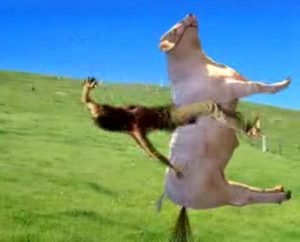 The researchers discovered two new proteins involved in causing diarrhea – interleukin-22 and claudin-2, which humans possess too.
The researchers discovered two new proteins involved in causing diarrhea – interleukin-22 and claudin-2, which humans possess too.
They found that when the mouse was infected, immune cells travelled to the intestinal wall and produced interleukin-22.
Interleukin-22 binds to cells on the intestinal wall, causing the release of another protein called claudin-2.
It’s claudin-2 that causes the leak in cellular junction in the intestinal wall, allowing water to enter it and cause diarrhea.
The researchers tested three different kinds of mice – regular mice, genetically modified mice that produce large amount of claudin-2, and mice that didn’t make any claudin-2.
The regular mice had diarrhea when they got sick, and the mice that made more claudin-2 always had diarrhea.
The mice that didn’t make any claudin-2 had more e injuries to their intestinal lining, and they still had diarrhea because it seemed as though their immune system attacked the cells help make some diarrhea.
In related poop news, Rob Knight, one of the founding fathers of gut microbiome research, in 2012, used the crowdfunding platform FundRazr to coax more than 9,000 volunteers into first donating money, and then sending samples of their poop through the mail. A team of researchers probed these samples for bacterial DNA to create the first census of the 40 trillion or so bacteria that call our guts their home.
Kyle Frischkorn of the Smithsonian quotes Knight, who directs of the Center for Microbiome Innovation at the University of California at San Diego, as saying, “You get an ongoing input of microbes from your environment—microbes you eat on food itself.”
One of the mysteries sparked by the American Gut Project was why two people who claimed to follow the same diet could have such different communities of gut microbes. For the study, volunteers had self-reported their diets, with the vast majority following omnivorous diets, and less than 3 percent each identifying as “vegetarian” or “vegan.” When researchers crunched the numbers, however, they found no discernible correlations between gut communities and those with seemingly similar diets.
“Diet categories were completely useless and didn’t correlate with the microbiome communities at all,” says Knight.
In other words, the bacteria in poop were telling a different dietary story than the people making that poop. “You can be a vegan who mostly eats kale, or you can be a vegan who mostly eats fries,” Knight explains. “Those have totally different consequences for your microbiome.” Anyone can claim to be a die-hard adherent to the Paleo Diet, it seems, but the data suggested that the microbiome remembers all those midnight ice cream transgressions.
Knight realized that the results of the American Gut Project were missing something crucial: A deeper dive into the food we eat. Filling that gap would mean analyzing all the food going in, and seeing how it correlated with the patterns in what comes out. But while collecting poop was, in some sense, straightforward—each person “submits a sample” in the same way—tallying up all the many foods people eat would be a lot more ambitious.
Every time you ingest, you change the interior landscape of you. Because the bulk of bacteria in the microbiome live in the gut, when we feed ourselves, we feed them too. The chemistry of what we eat, be it fries or kale, alters the chemical landscape of the gut, making it more cozy for some and less hospitable for others.
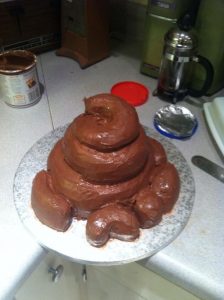 It gets livelier. Because microbes are everywhere—on the table, in the air, on the surface of the muffin you left out on the counter—you’re also adding new microbes to the mix. Some stroll through your body like polite tourists. Others stick around and interact with the locals. Every bite has the potential to alter the microbiome, and subsequently human health. But researchers have yet to figure out how.
It gets livelier. Because microbes are everywhere—on the table, in the air, on the surface of the muffin you left out on the counter—you’re also adding new microbes to the mix. Some stroll through your body like polite tourists. Others stick around and interact with the locals. Every bite has the potential to alter the microbiome, and subsequently human health. But researchers have yet to figure out how.
That’s because, until now, we didn’t have the platform to embark on the massive endeavor of collecting and analyzing food samples from around the world. Thanks to the American Gut Project, Knight and his team aren’t starting from scratch. Initially, the researchers plan to collect 1,000 samples from every brick of the familiar food pyramid, and then they’ll open it for the public to submit whatever foods they’re curious about.
“We know about calorie count, and about different food groups, but the whole world of the molecules and the microbes in our food is a black box,” says Julia Gauglitz, a post-doctoral researcher at the Center for Microbiome Innovation who will direct a new project. As the old adage goes, “we are what we eat,” she says. And yet, when you get down to the microscopic level, “we know very little about what we’re consuming.”
Everything we eat is the cumulative product of the chemistry and microbes in the soil where it was grown, the factory where it was processed, and whatever you touched right before you ate it. Why is that important? Ultimately, the team hopes, demystifying the microbial patterns in our food will help us better engineer our diets to improve our health and ward off disease.
Knight draws a historical parallel to the discovery of essential nutrients. In the last century, researchers figured out that industrially processed foods had become nutrient-depleted. By artificially adding vitamins and minerals back in, deficiency diseases like rickets and beriberi were largely eliminated from the Western world. Similarly, understanding the health effects of the microbiome could allow us to engineer those missing microbes back into our meals.
“It’s fairly likely that our modern lifestyles are stripping out a whole lot of live microbes that we need to maintain health,” says Knight. “Getting an understanding of that could be as important as the understanding that vitamin C is necessary and making sure that everyone got enough of it.”
barfblog.com on Brisbane TV (maybe)
I used to talk about food safety on TV.
Now I talk about real estate.
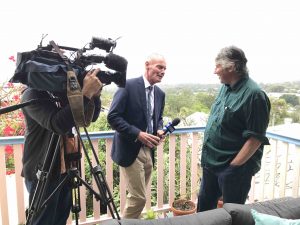 This is supposed to be on Channel 9 tonight at 6 p.m., about how Annerley, a suburb of Brisbane, is one of the top-5 places to buy.
This is supposed to be on Channel 9 tonight at 6 p.m., about how Annerley, a suburb of Brisbane, is one of the top-5 places to buy.
I know a lot more about food safety.
We love our neighborhood, with its diversity, and great view, so it was as easy gig.
My stand-by soundbite is: When we moved here six-years ago, my wife picked the suburb – a 12-minute bike ride to the University of Queensland, and a 12-minute drive to the (ice) arena at Acacia Ridge.
Who knows if it’ll make the cut.
Yes, I know I’m fat. Working on that.
Not in Kansas: Sometimes, ya just have to mow the lawn
I chatted with my 70ish-year-old mother the other day, and she said the rain had let up enough in Brantford, Ontario (that’s in Canada) so that she could cut the lawn.
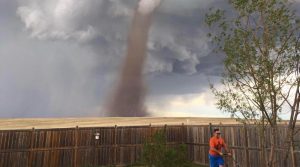 She didn’t mention anything about tornadoes.
She didn’t mention anything about tornadoes.
Ashifa Kassam of The Guardian reports a Canadian man’s commitment to lawn care has earned him international fame, after social media lit up with a photo of him mowing the lawn as a large tornado loomed on the horizon.
On Friday evening, as dark clouds began to gather near Three Hills, Alberta, Theunis Wessels paid little mind. Instead his thoughts were focused on the busy weekend that lay ahead for the family.
The list of chores he was hoping to get done included cutting the lawn. “I had to get it cut,” he told CTV News. “A lot of things happening over the weekend. Children were attending swim meets and some other sporting events over the weekend, so I had to make sure I got it done.”
He began mowing the lawn while his wife was napping. His nine-year-old daughter, nervous about the swirling twister gathering behind him, urged him to come inside. When he refused, she woke up his wife.
His wife, Cecilia Wessels, came out shortly after and snapped a few pictures, including one that captured her husband casually mowing the lawn against the dramatic backdrop of the tornado. It was the first time anyone in the family, originally from South Africa, had seen a tornado.
“I did ask him if he was coming inside with that thing in the clouds when I turned to come inside and he calmly said no,” she told the Associated Press.
Bird-flipping welcome for US Secretary of State Rex Tillerson in New Zealand
I’ve always enjoyed the time I spent in New Zealand.
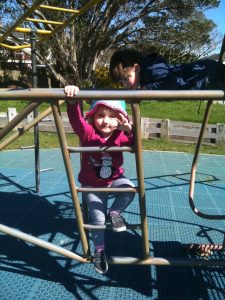 Maybe not as much as U.S. Secretary of State Rex Tillerson when he arrived in Wellington.
Maybe not as much as U.S. Secretary of State Rex Tillerson when he arrived in Wellington.
US media travelling with Tillerson were surprised by the number of people flipping the bird at Tillerson as his motorcade sped through town.
New York Times correspondent Gardiner Harris said he had been in a lot of motorcades but even he was taken back by the negative reaction.
“I’ve been in motorcades for a couple of years now … I’ve never seen so many people flip the bird at an American motorcade as I saw today,” Harris said.
Harris wasn’t the only one who noticed – US protection officers travelling by with Tillerson were overheard joking about the “warm” Wellington welcome.
Early morning playlist
High heels and diarrhea really don’t mix; ‘I thought maybe the guy next to me had farted’ It was pole dancers with diarrhea in Florida
I used to hang out at a strip club.
 When I was an undergrad, about 1984, when I didn’t have labs in the afternoon – which I did 3 days a week – I’d toddle home to Neeve St. in Guelph (that’s in Ontario, Canada, as I explained to a new neighbor I met on the morning walk to school today) and cross the train tracks to the strip club to eat lunch and read the paper (this was before, ipads, iphones, computers, whatever, we all bled the ink).
When I was an undergrad, about 1984, when I didn’t have labs in the afternoon – which I did 3 days a week – I’d toddle home to Neeve St. in Guelph (that’s in Ontario, Canada, as I explained to a new neighbor I met on the morning walk to school today) and cross the train tracks to the strip club to eat lunch and read the paper (this was before, ipads, iphones, computers, whatever, we all bled the ink).
I didn’t really pay attention to the strippers.
I never went at night, because it was full of drunk bogans.
The Border Herald reports that a popular strip club in Jacksonville, Florida has been closed until further notice after several dancers contracted diarrhea last Friday night. The cause of the incident, which remains under investigation, has been initially linked to a contaminated buffet at the venue. While the investigation continues, the venue has not been named.
According to reports by local media, the strip club was nearly full on Friday night when the incident occurred, and both staff and customers were reported to have eaten from the free buffet, which included the usual selection of ribs, chicken and deep-fried shrimp.
While the results of the lab analysis are yet to come back, one source familiar with the investigation told reported that bad shrimp was the most likely cause is the diarrhea. “Typically shrimp are involved in cases like this, particularly when they are not cleaned thoroughly.”
That’s bullshit. It’s improper holding temperatures, probably Staph or C. perfringens (I spell it out so I can commend myself on being able to spell it). Or noro.
Patrons at the venue who were sitting near the stage were the most directly affected by the incident, which occurred close to 11pm. According to a witness at the venue, three dancers were performing on separate poles when the first sign of trouble emerged.
“At first I picked up a bad smell; I thought maybe the guy next to me had farted,” said the witness, who declined to be named. “However, the smell got worse and I noticed that a lot of other guys were looking around to see what it was.”
It was at this point the first dancer to suffer from diarrhea was unable to control her bowels any longer, and ‘a stream of brown liquid soon gushed over the stage,’ according to the witness. “It was absolutely disgusting,” he told journalists. “A number of guests immediately puked. I personally ran for the exit, I lost all interest in the show.”
The other dancers on stage also suffered from diarrhea soon after and were forced to abandon their performance. “They had a hard time getting off the stage,” said one witness, who stayed to watch after the incident. “High heels and diarrhea really don’t mix.”
Some guests who had been enjoying the show also contracted diarrhea and there was a rush on the men’s bathroom, which unfortunately did not have enough stalls to cope with the sudden influx in demand.
Cleaners who were hired to deal with the mess reportedly were shocked at the condition of the venue. “Strip clubs are generally dirty places, but this was on a whole new level,” said one of the cleaning staff. “In my time, I’ve seen faeces in a urinal once or twice, but never in the sinks.”
In an effort to compensate customers for the incident, the venue’s management took to social media to offer free entry to any guests who had been at the club on Friday night. Management also noted that the free buffet will not be available until further notice.
The non-hockey fan’s guide to this year’s Stanley Cup Final
This is not the hockey I grew up watching, where players had a smoke and a beer between periods. This is fast, fun and furious.
 And if Nashville can embrace hockey (the ice kind for my Aussie friends) so can anyone.
And if Nashville can embrace hockey (the ice kind for my Aussie friends) so can anyone.
Pete Blackburn of Fox Sports writes:
So, what sport is this now?
Hockey.
Isn’t that the Canadian thing with the ice and skates that no one seems to care about?
Well, some of us care, and not just in Canada. But yes, it’s played on ice.
But why should I care now?
Because playoff hockey is amazing and one of the greatest viewing experiences in sports. At the end of the Stanley Cup Final all the players say the f-word on TV as they pass around giant trophy that everybody gets to kiss. It’s a lot of fun.
So, who is playing in this “Stanley Cup Final?”
The Pittsburgh Penguins and the Nashville Predators.
Wait, you mean to tell me Nashville, Tennessee has a hockey team?
Yep! They’re quite good and the city has grown to love them. It’s becoming a really fun hockey town and their crowds are wild and loud. They probably have one of the best playoff atmospheres in hockey. They’re really good at shouting mean things at opposing players in unison.
You also mean to tell me that there are “hockey towns” in the United States?
Yes, and this Final features two pretty good ones. In fact, a Canadian team hasn’t won the Stanley Cup since 1993.
That must be embarrassing for them.
Yeah, let’s not get into that.
Well, which one of these teams is better?
Well, the Penguins are the defending champions and they have a very good team with a few of the best players in the world (Sidney Crosby and Evgeni Malkin) so they’re slight favorites to win the Stanley Cup, even though they’re without their best defenseman (Kris Letang).
So I should root for them?
Sure, if you want to. They’re great at scoring goals (fun!) and it would be the first time in nearly 20 years that a team has won the Cup in back-to-back years.
How many Cups have the Predators won?
Zero. This is the first time they’ve even made it to the Final.
So they’re a bunch of losers?
No, that’s the Capitals. The Predators are just sort of new to the party. They’ve only been a team since 1997. The Penguins were founded 30 years before that. Nashville has a bright future.
Do the Predators actually have a chance?
Some of their better offensive players got hurt earlier in the playoffs but they’ve still got talented scorers like Filip Forsberg, Viktor Arvidsson and James Neal. They definitely still have a chance, mainly because their defense is so good, and that tends to be a huge factor in the playoffs.
Defense is for nerds.
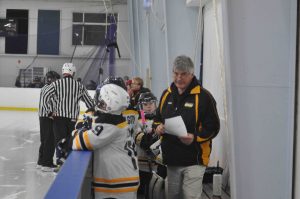 Somewhat agree, but the Predators defense is pretty good at scoring goals themselves. They’ve got a few impressive defensemen that are good at creating offense, including P.K. Subban.
Somewhat agree, but the Predators defense is pretty good at scoring goals themselves. They’ve got a few impressive defensemen that are good at creating offense, including P.K. Subban.
P.K. what now?
Pernell-Karl Subban. He’s on the Predators and is one of the best defensemen in the league. He scores a lot of goals and usually has awesome celebrations afterward. Plus, he’s funny and is really nice to sick kids. He once pledged to raise $10 million for a children’s hospital.
Oh, wow. Who wouldn’t love that guy?
Well…
What?
Well, he was actually traded to Nashville last summer by Montreal in a really surprising deal. He kinda got unfairly blamed for some of their disappointing playoff finishes and a lot of people think the Canadiens didn’t like his “character issues.”
What kind of character issues? Isn’t this the sport where the grown men are allowed to punch each other in the face?
Yeah, but some people apparently think that Subban is a clown for attracting attention to himself by having a lot of fun. The thought was that he “doesn’t hate to lose” enough. So they traded him for an older, more boring guy named Shea Weber.
How did that work out?
Well, the Predators are playing for the Stanley Cup and Montreal lost in the first round.
Oh. Yikes.
Yeah.
Is there anyone like that on the Penguins?
Well, a guy named Phil Kessel won a Stanley Cup in his first season with the Penguins last year. He’s awesome and goofy and really good at scoring goals. Toronto basically ran him out of town, too.
Why did they do that?
The team stunk so some of the media unfairly pinned it on him and said he was lazy, didn’t care enough and ate too many hot dogs.
Wait, what?
Nevermind. Let’s just move on.
So, yeah, you should definitely watch the Stanley Cup Final. You’ll either get to see a new-ish team with a wild fan base win their first-ever championship, or you’ll get to see some legends become the first repeat champions in almost two decades. Either way, it should be really fun and exciting, even if you’re not a big hockey fan.
But it sounds like both of these teams are enjoyable and likeable. Who do I choose?
Do you care about uniforms?
No, what kind of adult cares about sports uniforms?
I do. A lot.
Nerd. Who has the better uniforms?
Pittsburgh, by a mile. Their jerseys are some of the nicer ones in the league. The Predators dress like bottles of spicy mustard.
Go Predators.
Go Penguins.
Despite some first period jitters in game 1, I predict Predators in 7. And stay away from my bench (upper left, a look I perfected on graduate students who would submit writing but they hadn’t really tried; I’d get through one page and respond, try again).
Two grandsons, two birthdays, proud papa from afar
I had coffee with a friend this morning after dropping Sorenne off at school.
She was interested in psychology and I shared with her what I thought was relevant.
 But it was watching the women in my life skating last night, and I just sat there with a shit-eating grin on my face.
But it was watching the women in my life skating last night, and I just sat there with a shit-eating grin on my face.
Amy and Sorenne, playing hockey and wanting more ice.
Go figure.
Daughter 1 (Madelynn) and daughter 2 (Jaucelynn) both have children of their own now, with birthdays within a week.
Gabe turned 4, and Emerson turned 2.
They both apparently like cake
I miss them but it was best I leave, however painful that was.
And it was a long time ago.
Not everything is food safety
Travel woes en route to an FAO meeting (oh, that is a food safety hook) in Russia resulted in me having 12 hours to kill in Paris. Instead of staying in the city, I did something today that I’ve thought about for a while but had not had the chance- rented the world’s smallest stick shift car and traveled to Normandy. I drove through the French countryside and walked along Juno Beach where many Canadians landed on D-Day.
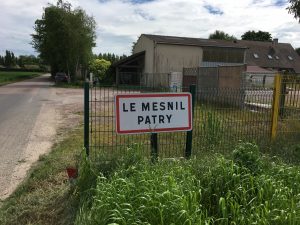
Most emotional for me was seeing an area of the world that had an impact on my life – the small villages of Le Mesnil-Patry and Norrey-en-Bessin. My grandfather, who Sam is named for, was part of a small group of seven that survived a battle where their company lost 98 soldiers. My grandfather was awarded a Distinguished Conduct Medal. Although we were very close he never spoke about it.




